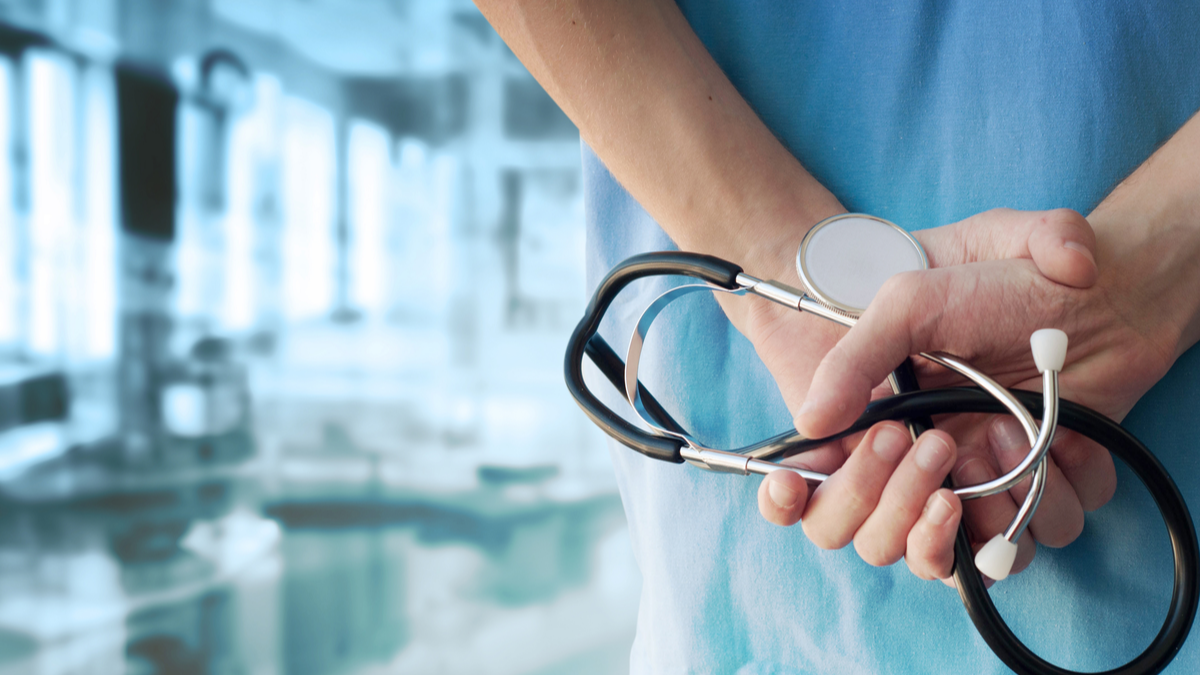I walked into my first rotation with a stethoscope and granola bar in my pocket and a LOT of nerves. I had no idea what to expect. I knew I had to impress my preceptor (which I imagined was easier said than done) and ace my shelf exam because this was the specialty I wanted to pursue. Talk about a lot of pressure. A fellow medical student and I walked into the hospital on the first day and while we were very obviously lost in the hallways, a tall man walks up to us and asks, “Are you looking for Dr. ___ ?” We slowly nodded our heads, still confused. He sticks out his hand and comments “well, you’ve found him.” So began our first day.
Medical School
Getting into medical school was only the first hurdle. Learn more about how to be successful in medical school.
Division of Labor: How to Keep a Household Running While Your Spouse is In Training
By Amy Rakowczyk, SDN Staff Writer
One of the biggest challenges that arises during medical school is actually all of the non-medical school “stuff”: namely, household duties and chores. How much help can you expect from your spouse in this regard, and how will you divide up the duties?
ShirlyWhirl, MD: The Life of a Med Student in Comic Form



Shirlene Obuobi draws the life of a medical student in her comic ShirlyWhirl, MD. See more comics on the ShirlyWhirl, MD Facebook and Instagram.
Tell us about yourself
My name is Shirlene; I’m 24 and go to Pritzker School of Medicine. I was born in Ghana and have lived in Chicago, small town Arkansas, The Woodlands, TX, and went to Washington University in St. Louis for undergrad. I enjoy writing, drawing, and long walks along the lakefront. I recently adopted a cat. His name is Kahlo.
What did you want to be when you were growing up?
I was one of those six-year-old children who said they wanted to be a doctor from the get-go. It’s a pretty boring origin story.
What drew you towards medicine?
My mom is a neonatologist, so I’ve had lifelong exposure. Like everyone else, I like that medicine is one of those careers that is both spiritually fulfilling (you get to directly change people’s lives! How cool is that! How arrogant are we that we’re okay with that level of responsibility!) and intellectually stimulating.
Tell us about ShirlyWhirlMD in a nutshell.
ShirlyWhirlMD is meant to convey typical experiences of healthcare professionals, and especially medical students, in fun comic form.
How did you come up with the idea for ShirlyWhirlMD?
I’ve been drawing for as long as I can remember! In high school I made little comics for our school newspaper; in college, I started a comic club (shoutout to KaPOW!) for the same purpose. I started drawing med school-related comics mostly as a way to de-stress and shared them with my class. My roommate suggested that I actually share them with a larger audience! So here we are.
What is your ultimate goal for your comics?
First, I want to help connect different healthcare professionals over common experiences in medicine, and also to spark dialogue about some of the things that go on in medicine that we don’t discuss amongst ourselves frequently. For example, I care a lot about advocacy, and think that as healthcare professionals we carry an unusual amount of clout in society. But we rarely discuss what we see, and what we can do about it. I also think it’s important to not take ourselves too seriously, and to let the rest of the world know not to take us too seriously either. I recently had an attending who is near retirement tell me that he was looking forward to regaining his pre-professional identity again after years of being Dr.___. I want my patients to be able to look me up and say, “this girl is goofy, but she’s honest and I like that.” I’m going to definitely start introducing more serious topics to my comics, and I really would love to see people interact with them!
How can comics like ShirlyWhirlMD help students and health professionals?
I think a lot of us suffer from a healthy dose of impostor syndrome—we worked hard to get into college, then into medical school, then residency. At every stage everyone around us becomes more and more impressive. So we tend not to talk to each other about our little insecurities, mistakes and frustrations. I think, on the student end at least, having this little comic reassure them that other people have similar experiences to theirs might make them realize that it’s ok to not have everything figured out.
What do you like to do for fun?
I also love to write. I draw (clearly), though the style I use in ShirlyWhirl, M.D. is actually very different from my usual work. I read a lot. I also like backpacking (the traveling kind) and have been all over Eastern Europe at this point.
Has your work on ShirlyWhirlMD changed the way you approach your future as a physician?
I am, at baseline, a pretty introspective person, but searching for material for my comic has forced me to be even more introspective. I have to be aware of my own biases and mental state when I’m taking care of patients. As the work gets more tiring and the amount of responsibility I have increases, I have to remember not to cut corners and to put myself in my patient’s shoes. For example, can I really be mad at the patient who is habitually non-compliant with his medications when I can barely remember to take my daily Zyrtec? Probably not.
What was the most challenging part of medical school for you?
What hasn’t been challenging? I think I’ll start with what hasn’t—for me, working with patients, learning the material itself, developing plans, all the aspects of medicine that drew me in—have kept their charm. The hardest parts have more to do with the culture of medicine, which basically expects people in training to be impervious to stress, illness, and to constant work. Third year you get evaluated clinically for the first time, and there’s a lot of internal pressure to already know everything at a time when you’re supposed to be learning. You’ve got to go to the hospital for 10-14 hours, come back and prepare for a shelf exam that you only have four to nine weeks to study for, which is graded on the most unforgiving curve because other medical students are wicked smart and very good at studying. If you don’t have a very secure support group, it can be isolating. If you already struggle with mental illness, it’s especially tough. Residency will just be more intense.
Are you interested in combining a career as a physician with creating comics or graphic novels? Here are some other interviews with physician-authors:
Has anything surprised you about your work on ShirlyWhirlMD?
Just how universal a lot of my experiences are. Not just to other medical students, but to people who are well into their careers!
Where do you see yourself in the next 10 years?
I just figured out what I’m doing for the next three. Don’t make me think further than that. I’ll be a doctor and still be drawing, I guess?
What do you think the next big thing in medicine/healthcare will be?
I think the healthcare system in America is in need of major revamping. It’s currently incredibly inequitable, unsustainable, and unethical. On the patient’s side, the costs are out of control–an uninsured patient can get charged $50k for an appendectomy, and what is he supposed to do about that? Shop around for the best price until his appendix ruptures and he ends up with acute abdomen? On the physician’s side, there’s no incentive to spend real time with your patients, no incentive to take on
patients that need you the most, like those on Medicaid and Medicare, and very little incentive to go into primary care. I’m really hoping we start moving toward a single-payer form of healthcare.
What’s your favorite premed or med school memory?
I have so many of these! As far as in-hospital shenanigans, probably dancing to “Lose Yourself” in the OR with my 70+ year old attending. For out-of-hospital shenanigans, maybe a road trip to Toronto with my classmates.
What impact do you hope ShirlyWhirlMD has on medicine over the next decade?
I hope it spawns more creatives in medicine to start sharing their work, and to become a stomping ground for physician-generated discussion!
We’re on the lookout for other Med Innovators! Do you know a student or resident doing something cool to advance healthcare? Let us know! Email us at editor@studentdoctor.net.
20 Clinical Practice Guidelines That Medical Students Should Know
Updated February 17, 2022. The article was updated to correct minor grammatical errors and formatting. … Read more
How To Make New Friends and Find A Community
If your spouse’s medical studies have recently brought you to a new city, or to a new community within a familiar city, you will need to search for new friends and support groups. Medical school is not about being “strong” and pushing through all the hard stuff. It’s about having people to lean on when the going gets tough.
Building yourself a new community and finding friends, especially those that you hope to be able to share your delightful, as well as dark moments with, is not an easy task. However, it is a necessary one!
Chronicles of a Med Student: The View From the Other Side of Boards
Finally on the other side! This morning I soaked in the luxury of not having … Read more
Dear Me, M3 | Love Me, MD
Dear Me, M3:
As graduation approaches and the days of fourth year freedom quickly fade away, the terrifying reality of being a stupefied intern becomes more and more paralyzing. Self-doubt started as a whisper but is slowly escalating to a deafening scream. I have read and re-read the letter you wrote in attempt to silence the negativity— to remember how I felt as a naive third year student trying to navigate the world of clinical medicine— to remind myself of a time when graduation was an unforeseeable future and matching into residency seemed like an absurd possibility. Undoubtedly, your foresight advice will sharpen my self-awareness and hold me accountable to be kind and compassionate, to stay humble. Yet, in order to reassure myself that I will make it, to bury the self-doubt, it is time for some self-to-self hindsight advice— time to remind myself of lessons learned along the way. So here it goes:
The Year of Privilege, Part 2
In my last article, I wrote about my perspective on the third year of medical school and how it has evolved over the course of this year. Medical education is unfortunately sparse with free time, which makes it difficult to reflect; writing these posts has been one way for me to slow down and process all the things I’ve seen, the knowledge I’ve gained, and the relationships I’ve built with patients. It was the process of doing this that led to last month’s article, highlighting some of the amazing things I’ve gotten to do this year and some general themes about the clinical side of medical school.
My Own Little Ice Age
Reposted with permission from here. I can finally say I’m in my last year of … Read more
What to Expect as a Med School Spouse: Years 3 and 4
By Amy Rakowczyk, SDN Staff Writer
With Step 1 completed, and hopefully after a little R&R, your spouse is ready to get out there and try their hard-won knowledge in the clinics! Also coming up, your spouse will be selecting a specialty and starting the process of researching residency programs. They will put their application package together, go through the interview process, rank the programs, and wait for the much anticipated Match Day, then graduation! It will be a lot in a short amount of time, so here’s your breakdown of what to expect!
Dear Me, MD | Love Me, M3
July 21, 2015
Dear Me, MD:
Now that you have opened this letter, you may have graduated or maybe you just matched into residency— somewhere, anywhere, hopefully?! As you read this, it should be some time during spring 2017. But, you never know, sometimes the train derails and it takes a little longer than expected, so forgive yourself if that is the case. You learned a while back that the fast lane is overrated so never mind months or years. You now have the degree that you worked so tirelessly for; the one they told you that you would never get; the degree that bears the title I know you will probably never feel is real.
The Year of Privilege: A New Perspective on Third Year
During my pediatrics clerkship, one of our core faculty gave a lecture during orientation. This orientation lecture was particularly good, as the professor giving it was one of our most-loved faculty members who is deeply in tune with medical students at all stages. This was back in the summer when we were just getting started with our clinical experiences, but what he said stuck with me all year. He noted with a bit of humor that third-year medical students are the lowest of the low—barely even acknowledged by many team members, ignored by some patients who refuse to talk to anyone but a “real doctor,” disregarded by residents unless it is to point out something you are doing wrong. We chuckled, already able to relate with this view, but he turned the conventional description on its head by encouraging us to think of the third year of medical school as “the year of privilege.”
Conquer the Obstacle Course of Medical School By Building Multiple Strengths
Everyone has this perfect image of how fun medical school is when they enter. You daydream about working with patients and saving lives from your first year, but the reality is, medical school is a giant obstacle race. Many people say that it is a marathon, but I do not think that this is accurate. A marathon requires you to be a good runner. Marathon training is gruesome and tiring, but the focus is on increasing your mileage until you feel confident that you can achieve the 26.2 miles on race day. Obstacle race training, on the other hand, is a little more dynamic. You must train yourself to be able to handle the long mileage of running the course, but you also have to develop your body and mind to conquer obstacles requiring strength, agility, strategy, and overall grit. In my drawn-out analogy here, obstacle race training is the “preparing to apply for medical school” stage and the actual application and interview seasonCon is the beginning of your long obstacle race that ends with a medical degree. I will come back to these two points, but first I would like to elaborate on why medical school is an obstacle race.
Chronicles of a Med Student: Flexibility in Practice
For a typical medical student shadowing in a clinic for a day, it looks a little something like this: we enter the familiar setting of an outpatient clinic and help as the attending physician sees patient after patient in quick fifteen minute intervals. We also get to see things that patients are not privy to—the virtual stacks of paperwork that wait at the end of each visit, the phone calls for consults, the appropriate orders for the workup of a certain condition in a certain patient. It all seems like a blur. Then we think about the clinical world before we even get to practice as a physician: the years of clinical rotations and especially residency are much more daunting, with their own strict rules, long work hours, and meager pay. Do I have to end up in an office or hospital setting? This is a thought that crept into my mind after hours of clinic observation. What I saw as a pre-medical student is somewhat different than what I experience as a medical student which makes this question far more relevant.
4 Reasons First-Year Medical Students Should Reflect on Their Initial Clinical Experiences
Many medical schools are now enhancing their preclinical curriculum (which is typically taught in the first two years of the program) with mandatory and optional clinical opportunities. Though intensive clinical exposure is typically reserved for third- and fourth-year rotations and sub-internships, students whose early curriculum provides clinical experiences should reflect on the impact of these opportunities.
If you are in a medical school with early clinical exposure, consider evaluating these experiences for the following reasons:
What to Expect as a Med School Spouse: Years 1 and 2
By Amy Rakowczyk, SDN Staff Writer
Congratulations! You are now officially a Medical Spouse. This is a highly rewarding, and also a highly challenging role. You’ve undoubtedly heard that “medical school is hard” and that there is a lot of studying and exams ahead. Your spouse is about to embark upon a completely new path, and you as the spouse, are along for the ride. This article is here to help you understand what’s in store so you can prepare yourself for the next two years!
A Med Student’s Guide to Becoming a Physician-Scientist
When medical students start to think about areas of practice to specialize in once they graduate, the area of medical research can sometimes be overlooked in favor of more traditional practice areas such as internal medicine or surgery. However, for some doctors-to-be, the pull towards such research is strong and it is an important part of the healthcare system, as the discoveries that such scientists make can have an impact on techniques used to improve patient care and outcomes.
This article covers the work and scope of physician-scientists as well as educational pathways these professionals pursue in order to undertake their important work.
Balancing Medical Education and Parenthood
One thing most people will agree that medical education and parenthood have in common is … Read more
So Little Time: Prioritizing For Healthy Time Management
As I enter the thick of studying for board exams, I’m reminded even more every day to stay calm, grounded, and keep my head clear. This is the last semester of my pre-clinical education (I can’t believe how time has flown!), and I’m caught in a balance of staying positive about that as well as juggling my hours of studying for board exams. I’ve experienced just about every emotion in the past few weeks, but one of them has always been there lurking underneath the surface: the feeling of being overwhelmed. I’ve touched on this multiple times before, but I cannot stress enough how important it is to stay mentally stable and sane through the medical training process! I have found myself slipping these last few weeks as I try to “do it all”, so I had to reach out.
Drug Use Among Medical Students
Updated November 15, 2021. The article was updated to correct minor grammatical errors and to … Read more














